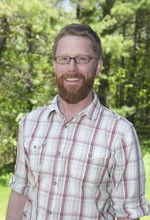GV student tackles physical disabilities with theater

Courtesy Photo / gvsu.edu Professor Austin Bunn, who works with the Theater for the Deaf organization
Feb 3, 2011
Sometimes, the arts have the chance to truly transcend everything, even sensory loss. In the case of a special theater and playwriting class being taught by Grand Valley State University student Emma Carlton, teenagers are learning how to use theater to overcome physical disabilities.
In conjunction with VSA Michigan, the state organization on arts and disability, Carlton is currently co-teaching a class for deaf teenagers with cochlear implants from Grand Rapids Public Schools Oral/Deaf Program.
“It’s a group of 11 teenagers who all have had profound hearing loss, but since gaining cochlear implants, are considered ‘recent hearers,’” Carlton said. “I got involved after a teacher asked me if I was interested, and jumped at the chance. I have a strong interest in teaching writing in the future, so an opportunity to be involved in that before finishing my undergrad degree definitely appealed to me.”
Along with Carlton, GVSU professor Austin Bunn, Hope theater professor Jean Bahle and VSA member Michele Suchovsky have also been involved with the class. Suchovsky teaches the class with Chris Grooms from Circle Theatre Grand Rapids.
“The class is a really fantastic project,” she said. “The student base is multi-cultural and takes place every week, once a week, during the winter semester.”
Dreams are the theme of this year’s project, something that Suchovsky said she is really excited to see discussed.
“It will just be dreams generally, but that in and of itself is a fantastic topic for this group to further talk about,” she said. “As a larger curriculum goal, the kids are setting goals for their life and dreaming about what they want to achieve and creating the steps that they need and what difficulties/obstacles they will have to face and overcome to achieve those dreams.”
Within the course, students will read and write scripts among other things.
“There is a lot going on this semester,” Carlton said. “The students start by reading scripts and understanding the concept behind not only writing, but acting for a play. They will write scripts, practice plays with the ultimate goal of each student performing their play with local actors.”
These students, who have become known as the “Cool Cats,” will also begin reading aloud and will learn breathing rhythms, voice range and control during the course.
Made possible through support from the Grand Rapids Community Foundation’s Good School’s grants program and the Arts Education grant program of the Arts Council of Greater Grand Rapids, those behind this course find a deep importance in promoting the arts.
“I think arts education in general is really important, but I especially love what we’re doing here,” Carlton said. “First of all, none of these kids had ever heard of theater or a play before. When we first met them and brought up the idea of theater, they thought we were talking about movies. So we’re showing them a whole world they didn’t know existed, which I think is worth it all by itself.”
She also believes this will effect these students on a much more broad level.
“On a technical level, I think both the breathing and vocal exercises you learn in theater classes and the writing experience they’ll get from trying their hands at playwriting will help them learn to communicate better,” she said. “Theater is an essential part of education, especially for kids with disabilities. Theater’s silly, it’s expressive, it’s a little ridiculous at times, and for kids to be not only allowed but encouraged to be like that in a specific, organized setting lets them feel a little better about who they are: kids.”

























